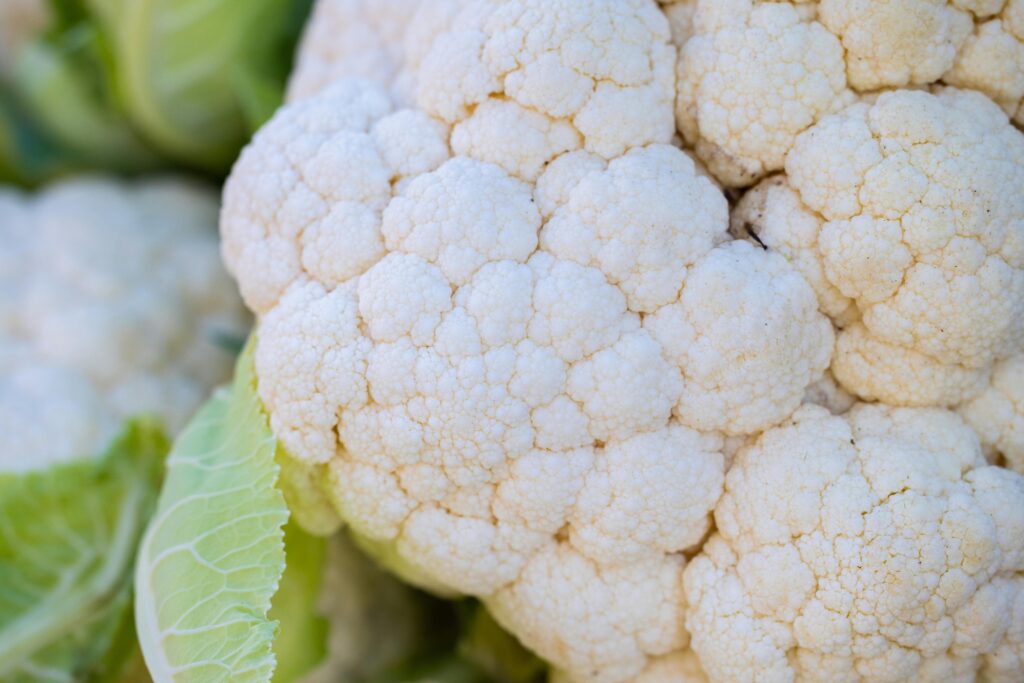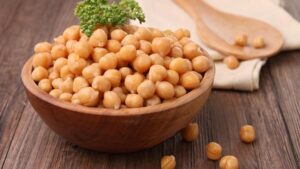Cauliflower

Cauliflower is a nutritious and versatile vegetable that belongs to the cruciferous family, which includes broccoli, cabbage, and kale. Known for its dense, tightly packed white florets, cauliflower has a mild, slightly nutty flavor and is used in a variety of dishes worldwide.
1. Rich in Nutrients
- Vitamins: High in vitamin C (boosts immune health) and vitamin K (important for bone health and blood clotting).
- Minerals: Contains potassium, magnesium, and manganese.
- Fiber: Promotes healthy digestion and supports gut health.
- Low in Calories: Ideal for weight management.
2. High in Antioxidants
- Contains compounds like glucosinolates and isothiocyanates, which may help protect against cancer by reducing oxidative stress and inflammation.
- Rich in carotenoids and flavonoids, which support overall cellular health.
3. Supports Heart Health
- The fiber, potassium, and antioxidants in cauliflower help lower blood pressure and reduce the risk of cardiovascular diseases.
4. Anti-Inflammatory Properties
- Sulforaphane, a compound found in cauliflower, has been shown to reduce inflammation and may help protect against chronic diseases.
5. Promotes Healthy Digestion
- The fiber content encourages regular bowel movements and maintains a healthy gut microbiome.
6. Low-Carb Alternative
- Cauliflower is a popular substitute for high-carb foods like rice, potatoes, and pizza crust, making it suitable for low-carb or ketogenic diets.
7. Supports Brain Health
- Rich in choline, which plays a role in brain development and function, memory enhancement, and learning.
8. Helps Detoxify the Body
- Glucosinolates in cauliflower support liver enzymes in detoxifying the body and may help reduce the effects of harmful toxins.
9. Boosts Immune System
- The vitamin C content enhances the immune system’s function and helps combat infections.
10. May Aid in Weight Loss
- Low in calories but high in water and fiber, cauliflower can help you feel full while keeping calorie intake low.
Including cauliflower in your meals is easy due to its versatility. It can be roasted, steamed, mashed, or blended into soups and sauces. Whether consumed raw or cooked, it’s a valuable addition to a balanced diet.
Here’s a simple and delicious recipe for Roasted Cauliflower:
Ingredients:
- 1 medium head of cauliflower, cut into bite-sized florets
- 3 tablespoons olive oil
- 2 cloves garlic, minced
- 1 teaspoon smoked paprika (optional)
- 1 teaspoon cumin powder (optional)
- ½ teaspoon salt
- ¼ teaspoon black pepper
- Optional toppings: grated Parmesan, chopped fresh parsley, or a squeeze of lemon juice
Instructions:
- Preheat the oven to 425°F (220°C). Line a baking sheet with parchment paper or lightly grease it.
- Prepare the cauliflower: Wash and dry the florets thoroughly. Place them in a large mixing bowl.
- Season the cauliflower: Drizzle the olive oil over the florets. Add the garlic, smoked paprika, cumin powder, salt, and black pepper. Toss everything until the cauliflower is evenly coated.
- Arrange on the baking sheet: Spread the seasoned florets in a single layer on the baking sheet, ensuring there’s space between each piece for even roasting.
- Roast in the oven: Bake for 20-25 minutes, flipping the florets halfway through, until they are golden brown and slightly crispy on the edges.
- Serve: Remove from the oven and let cool for a minute. If desired, sprinkle with grated Parmesan, parsley, or a squeeze of lemon juice for added flavor.

Enjoy as a side dish or a healthy snack!





